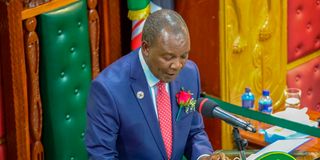
National Treasury and Economic Planning Cabinet Secretary Prof Njuguna Ndung’u reads the budget in Parliament on June 13.
The National Assembly will this week debate the Finance Bill, 2024 despite questions emerging over its constitutionality as some of the laws the Bill seeks to amend require the input of the Senate.
The Finance Bill is by design a “Money Bill” as per the definition of Article 109 of the Constitution, which means that the Bill is the exclusive mandate of the National Assembly.
The House Finance and National Planning Committee will table a report on the Bill on Tuesday, June 18 after concluding at least two weeks of public hearings that saw over 500 memoranda from Kenyans and other interested parties submitted.
The Bill, which seeks to amend 10 pieces of legislation, projects to raise Sh347 billion to finance the Sh3.9 trillion budget for the 2024/25 financial year as unveiled by National Treasury Cabinet Secretary Prof Njuguna Ndung’u last Thursday.
The laws earmarked for changes include the Value Added Tax (VAT) Act, Income Tax Act, Excise Duty Act, the Tax Procedures Act and Miscellaneous Fees and Levies Act.
Motor vehicle tax
The others are Affordable Housing Act, Data Protection Act, Public Finance Management (PFM) Act, Industrial Training Act and Kenya Revenue Authority (KRA) Act.
However, it is the inclusion in the Bill of the Affordable Housing Act, Data Protection Act and PFM Act that has threatened to have the constitutionality of the Bill, once it becomes law, challenged in court if the Senate is not involved.
The proposed imposition of the motor vehicle circulation tax at the rate of 2.5 percent of the value of the vehicle via an amendment to Section 12 of the Income Tax Act has also been included in the Bill despite concerns that it is a county government function.
Section 110 (3) of the Constitution states; “Before either House considers a Bill, the Speakers of the National Assembly and Senate shall jointly resolve any question as to whether it is a Bill concerning counties.”
On Sunday, June 16, National Assembly Speaker Moses Wetang’ula and his Senate colleague Amason Kingi did not respond to our inquiries sent to their known phone numbers on whether they met over the Bill before it was considered by the National Assembly.
But even as the two Speakers of Parliament remained mute, Narok Senator Ledama Ole Kina termed the proposed changes to the three laws without the input of Senate as “illegal and unconstitutional.”
“They want to amend the laws through the back door, but we will not accept this,” said Mr Ole Kina.
According to him, by including the provisions of the three Acts in the Finance Bill 2024, it means that the Bill concerns counties and must be passed in accordance with Articles 110 to 113, Articles 122 and 123 of the Constitution and the Standing Orders of the Houses.
Article 122 relates to voting in the National Assembly while Article 123 is on decisions of the Senate.
The Constitution in Article 109 (3) states; “A Bill not concerning county governments is considered only in the National Assembly, and passed in accordance with Article 122 of the Constitution and the Standing Orders of the National Assembly”.
But the question of its constitutionality can only arise after the Bill has been passed by the House and assented to by the President.
There is also the doctrine of separation of powers between the three arms of government — Executive, Legislature and Judiciary.
The Affordable Housing Act was enacted with the concurrence of the two Houses early this year.
This means that any amendment to the Act can only be done with the concurrence of the two Houses.
The Bill seeks the authority of the National Assembly to repeal Section 54 of the Affordable Housing Act, which was introduced by the Senate to ring-fence and provide safeguards against selling the affordable housing units to rich individuals.
“Except with the prior written consent of the board, a purchaser of an affordable housing unit under this Act shall not by contract, agreement or otherwise, sell or agree to sell his or her unit or any interest therein to any other person,” the section proposed for repeal reads.
Initially, the National Assembly had not included this provision in the version of the Bill it passed and transmitted to the Senate for concurrence.
This provided the loophole for the rich to buy the houses, effectively defeating the concept of “affordable housing.”
Accountant Ernest Muriu of Ernest and Associates notes that the imposition and administration of the proposed motor vehicle circulation tax is a preserve of the county governments as it is a property rate and not an income and therefore “does not sit well with the provisions of the Income Tax Act”.
“The proposed motor vehicle tax is a property rate that touches on the county governments. Only the counties can impose the tax and not the national government,” he says.
Mr Muriu is basing his arguments on Article 209 (1) of the Constitution that provides the taxes that the national government may impose as well as Section 5 of the Rating Act.
The taxes a national government may impose include Income Tax, VAT, Customs Duties and other duties on import and export goods and excise tax.
Part three of this Article, however, states that only a county may impose property rates, entertainment taxes and any other tax that it is authorised to impose charges for the services they provide.
Article 260 of the Constitution defines “property” to include any vested or contingent right to, or interest in or arising from land or permanent fixtures on or improvements to land, goods or personal property, intellectual property or money.
“This proposal does not therefore comply with Article 114 of the Constitution as this is a matter that must be dealt with by both Houses of Parliament. It is not in the exclusive jurisdiction of the National Assembly,” says Mr Muriu.
Article 114 of the Constitution provides that a Money Bill may not deal with any matter other than taxes, the imposition of charges on a public fund or the variation or repeal of any of those charges.
The Bill proposes to amend Section 51 of the Data Protection Act to empower KRA to access personal data without a court order in its enforcement of the collection of taxes, in what would likely be an infringement of privacy.
Data protection
The section targeted for amendment provides for exemptions in the administration of the Act.
Section 51 of the Act provides that “nothing in this part shall exempt any data controller or data processor from complying with data protection principles relating to lawful processing, minimisation of collection, data quality, and adopting security safeguards to protect personal data.”
Part two says that the processing of personal data is exempt from the provisions of “this Act” only if it relates to processing of personal data by an individual in the course of a purely personal or household activity.
It goes on to state that processing of personal data is exempt if it is necessary for national security or public interest or disclosure is required by or under any written law or by an order of the court.
The Bill also amends the PFM Act to introduce accrual accounting in government as opposed to the cash basis.
Accrual accounting records revenue and expenses when transactions occur but before money is received or dispensed.
Cash basis accounting records revenue and expenses when cash related to those transactions is received and dispensed.








